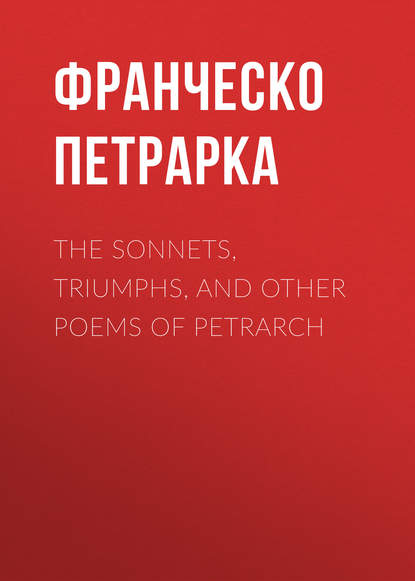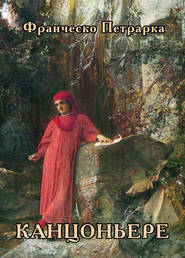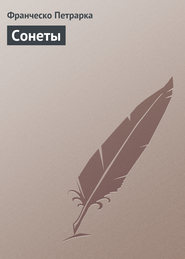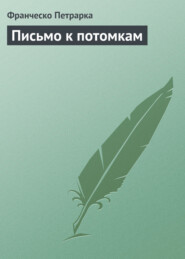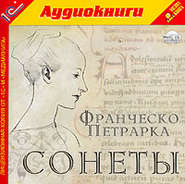По всем вопросам обращайтесь на: info@litportal.ru
(©) 2003-2025.
✖
The Sonnets, Triumphs, and Other Poems of Petrarch
Настройки чтения
Размер шрифта
Высота строк
Поля
How near you are your end; behold, I am
She, whom they, fierce, and blind, and cruel name,
Who meet untimely deaths; 'twas I did make
Greece subject, and the Roman Empire shake;
My piercing sword sack'd Troy, how many rude
And barbarous people are by me subdued?
Many ambitious, vain, and amorous thought
My unwish'd presence hath to nothing brought;
Now am I come to you, while yet your state
Is happy, ere you feel a harder fate."
"On these you have no power," she then replied,
(Who had more worth than all the world beside,)
"And little over me; but there is one
Who will be deeply grieved when I am gone,
His happiness doth on my life depend,
I shall find freedom in a peaceful end."
As one who glancing with a sudden eye
Some unexpected object doth espy;
Then looks again, and doth his own haste blame
So in a doubting pause, this cruel dame
A little stay'd, and said, "The rest I call
To mind, and know I have o'ercome them all:"
Then with less fierce aspect, she said, "Thou guide
Of this fair crew, hast not my strength assay'd,
Let her advise, who may command, prevent
Decrepit age, 'tis but a punishment;
From me this honour thou alone shalt have,
Without or fear or pain, to find thy grave."
"As He shall please, who dwelleth in the heaven
And rules on earth, such portion must be given
To me, as others from thy hand receive,"
She answered then; afar we might perceive
Millions of dead heap'd on th' adjacent plain;
No verse nor prose may comprehend the slain
Did on Death's triumph wait, from India,
From Spain, and from Morocco, from Cathay,
And all the skirts of th' earth they gather'd were;
Who had most happy lived, attended there:
Popes, Emperors, nor Kings, no ensigns wore
Of their past height, but naked show'd and poor.
Where be their riches, where their precious gems,
Their mitres, sceptres, robes, and diadems?
O miserable men, whose hopes arise
From worldly joys, yet be there few so wise
As in those trifling follies not to trust;
And if they be deceived, in end 'tis just:
Ah! more than blind, what gain you by your toil?
You must return once to your mother's soil,
And after-times your names shall hardly know,
Nor any profit from your labour grow;
All those strange countries by your warlike stroke
Submitted to a tributary yoke;
The fuel erst of your ambitious fire,
What help they now? The vast and bad desire
Of wealth and power at a bloody rate
Is wicked,—better bread and water eat
With peace; a wooden dish doth seldom hold
A poison'd draught; glass is more safe than gold;
But for this theme a larger time will ask,
I must betake me to my former task.
The fatal hour of her short life drew near,
That doubtful passage which the world doth fear;
Another company, who had not been
Freed from their earthy burden there were seen,
To try if prayers could appease the wrath,
Or stay th' inexorable hand, of Death.
That beauteous crowd convened to see the end
Which all must taste; each neighbour, every friend
Stood by, when grim Death with her hand took hold,
And pull'd away one only hair of gold,
Thus from the world this fairest flower is ta'en
To make her shine more bright, not out of spleen
How many moaning plaints, what store of cries
Were utter'd there, when Fate shut those fair eyes
For which so oft I sung; whose beauty burn'd
My tortured heart so long; while others mourn'd,
She pleased, and quiet did the fruit enjoy
Of her blest life: "Farewell," without annoy,
"True saint on earth," said they; so might she be
Esteem'd, but nothing bates Death's cruelty.
What shall become of others, since so pure
A body did such heats and colds endure,
And changed so often in so little space?
Ah, worldly hopes, how blind you be, how base!
If since I bathe the ground with flowing tears
For that mild soul, who sees it, witness bears;
And thou who read'st mayst judge she fetter'd me
The sixth of April, and did set me free
On the same day and month. Oh! how the way
Of fortune is unsure; none hates the day
Of slavery, or of death, so much as I
Abhor the time which wrought my liberty,
And my too lasting life; it had been just
My greater age had first been turn'd to dust,
And paid to time, and to the world, the debt
I owed, then earth had kept her glorious state:
Now at what rate I should the sorrow prize
I know not, nor have heart that can suffice
The sad affliction to relate in verse
Of these fair dames, that wept about her hearse;
She, whom they, fierce, and blind, and cruel name,
Who meet untimely deaths; 'twas I did make
Greece subject, and the Roman Empire shake;
My piercing sword sack'd Troy, how many rude
And barbarous people are by me subdued?
Many ambitious, vain, and amorous thought
My unwish'd presence hath to nothing brought;
Now am I come to you, while yet your state
Is happy, ere you feel a harder fate."
"On these you have no power," she then replied,
(Who had more worth than all the world beside,)
"And little over me; but there is one
Who will be deeply grieved when I am gone,
His happiness doth on my life depend,
I shall find freedom in a peaceful end."
As one who glancing with a sudden eye
Some unexpected object doth espy;
Then looks again, and doth his own haste blame
So in a doubting pause, this cruel dame
A little stay'd, and said, "The rest I call
To mind, and know I have o'ercome them all:"
Then with less fierce aspect, she said, "Thou guide
Of this fair crew, hast not my strength assay'd,
Let her advise, who may command, prevent
Decrepit age, 'tis but a punishment;
From me this honour thou alone shalt have,
Without or fear or pain, to find thy grave."
"As He shall please, who dwelleth in the heaven
And rules on earth, such portion must be given
To me, as others from thy hand receive,"
She answered then; afar we might perceive
Millions of dead heap'd on th' adjacent plain;
No verse nor prose may comprehend the slain
Did on Death's triumph wait, from India,
From Spain, and from Morocco, from Cathay,
And all the skirts of th' earth they gather'd were;
Who had most happy lived, attended there:
Popes, Emperors, nor Kings, no ensigns wore
Of their past height, but naked show'd and poor.
Where be their riches, where their precious gems,
Their mitres, sceptres, robes, and diadems?
O miserable men, whose hopes arise
From worldly joys, yet be there few so wise
As in those trifling follies not to trust;
And if they be deceived, in end 'tis just:
Ah! more than blind, what gain you by your toil?
You must return once to your mother's soil,
And after-times your names shall hardly know,
Nor any profit from your labour grow;
All those strange countries by your warlike stroke
Submitted to a tributary yoke;
The fuel erst of your ambitious fire,
What help they now? The vast and bad desire
Of wealth and power at a bloody rate
Is wicked,—better bread and water eat
With peace; a wooden dish doth seldom hold
A poison'd draught; glass is more safe than gold;
But for this theme a larger time will ask,
I must betake me to my former task.
The fatal hour of her short life drew near,
That doubtful passage which the world doth fear;
Another company, who had not been
Freed from their earthy burden there were seen,
To try if prayers could appease the wrath,
Or stay th' inexorable hand, of Death.
That beauteous crowd convened to see the end
Which all must taste; each neighbour, every friend
Stood by, when grim Death with her hand took hold,
And pull'd away one only hair of gold,
Thus from the world this fairest flower is ta'en
To make her shine more bright, not out of spleen
How many moaning plaints, what store of cries
Were utter'd there, when Fate shut those fair eyes
For which so oft I sung; whose beauty burn'd
My tortured heart so long; while others mourn'd,
She pleased, and quiet did the fruit enjoy
Of her blest life: "Farewell," without annoy,
"True saint on earth," said they; so might she be
Esteem'd, but nothing bates Death's cruelty.
What shall become of others, since so pure
A body did such heats and colds endure,
And changed so often in so little space?
Ah, worldly hopes, how blind you be, how base!
If since I bathe the ground with flowing tears
For that mild soul, who sees it, witness bears;
And thou who read'st mayst judge she fetter'd me
The sixth of April, and did set me free
On the same day and month. Oh! how the way
Of fortune is unsure; none hates the day
Of slavery, or of death, so much as I
Abhor the time which wrought my liberty,
And my too lasting life; it had been just
My greater age had first been turn'd to dust,
And paid to time, and to the world, the debt
I owed, then earth had kept her glorious state:
Now at what rate I should the sorrow prize
I know not, nor have heart that can suffice
The sad affliction to relate in verse
Of these fair dames, that wept about her hearse;





